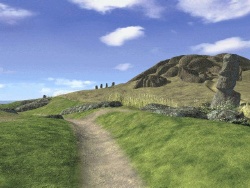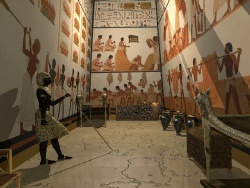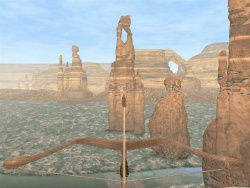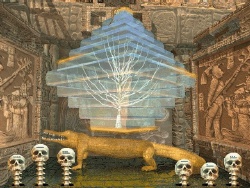|
TimeLapse (Second Opinion)
 Just
when you thought it was time for that well-deserved rest... your lifelong friend Professor Alexander
Nichols (who unfortunately bears more than a passing resemblance to Steve Martin to be taken seriously)
leaves a message on your answering machine which begs your immediate departure for Easter Island.
Frankly, I'd be inclined to leave my answering machine permanently disconnected if I had friends like
this. Anyway, it seems that dear old Alex has got himself stuck in something called a 'time gate'
and you are the only person in the whole universe who can possibly rescue him. Don't you just hate
it when that happens? Just
when you thought it was time for that well-deserved rest... your lifelong friend Professor Alexander
Nichols (who unfortunately bears more than a passing resemblance to Steve Martin to be taken seriously)
leaves a message on your answering machine which begs your immediate departure for Easter Island.
Frankly, I'd be inclined to leave my answering machine permanently disconnected if I had friends like
this. Anyway, it seems that dear old Alex has got himself stuck in something called a 'time gate'
and you are the only person in the whole universe who can possibly rescue him. Don't you just hate
it when that happens?
The ensuing action takes place in five different worlds: Easter Island, Ancient Egypt, Mayan Jungle,
Anasazi Pueblo (American Southwest for the uninitiated), and Atlantis. On the surface, TimeLapse bears
more than a passing resemblance to MYST. There, I've said it. Now on with the review!
Firstly, let it be said that the ray-traced images in TimeLapse are nothing short of breathtaking. The
images fill the entire screen, so you really can become immersed in the scenes. Of particular interest
is the attention paid to the flora and fauna in the various environments, most notably in the Mayan
Jungle. The ambient nature sounds and music score are also extremely well done. I found at least one
catchy tune in each of the three middle sections of the game. You know you're hooked when you find
yourself humming the things at work the next day.
 I
do, however, feel that TimeLapse suffers from that modern malady which is otherwise known as 'mass
appeal'. Either the kids these days are getting smarter by the minute, or maybe I should avoid buying
games in the future which purport to be solvable by 6 year-olds. In any case, while some of the puzzles
are very enjoyable, an elapsed time of 3 weeks from start to finish doesn't quite cut it when a game
has no replay value. Yes, it does have multiple endings, but they are all precipitated in your last
5 minutes of gameplay. I
do, however, feel that TimeLapse suffers from that modern malady which is otherwise known as 'mass
appeal'. Either the kids these days are getting smarter by the minute, or maybe I should avoid buying
games in the future which purport to be solvable by 6 year-olds. In any case, while some of the puzzles
are very enjoyable, an elapsed time of 3 weeks from start to finish doesn't quite cut it when a game
has no replay value. Yes, it does have multiple endings, but they are all precipitated in your last
5 minutes of gameplay.
Veteran adventurers will find little here to stump them for long as most of the puzzles are based on
pattern/sound matching themes. I found the puzzles in the Anasazi section to be the most challenging
and aesthetically pleasing. There are a few embedded skill games, but while visually stunning, they
mostly involve pure luck and were easily won on the first attempt (except for that bit of archery
required in the Anasazi section ... ouch!). In the Mayan section, there is an interesting animal
variation on the old 'scissors-cuts-paper-but-breaks-on-rock' game which is great fun to watch.
 As
an aid to solving all these pattern matching puzzles without having to make hand drawn sketches of
everything in sight, you are facilitated by a camera which can take snapshots of portions of the screen.
Frugality is the order of the day here, for once you have taken 36 exposures, it's finito. I compromised
in the end and used about half the roll, taking pictures only when something was too complex to draw. I
thought the camera was a nice touch. You also have the professor's journal to aid in your quest. For
each section of the game, it contains roughly 40 pages of hand-written text and Alex's own photos. There
is some good background historical information contained therein ... and the (very) sparse clue or two.
The only drawback I found in using it was that each time you open it you're back to page 1, which is a
bit disconcerting if you need to examine page 36 again. As
an aid to solving all these pattern matching puzzles without having to make hand drawn sketches of
everything in sight, you are facilitated by a camera which can take snapshots of portions of the screen.
Frugality is the order of the day here, for once you have taken 36 exposures, it's finito. I compromised
in the end and used about half the roll, taking pictures only when something was too complex to draw. I
thought the camera was a nice touch. You also have the professor's journal to aid in your quest. For
each section of the game, it contains roughly 40 pages of hand-written text and Alex's own photos. There
is some good background historical information contained therein ... and the (very) sparse clue or two.
The only drawback I found in using it was that each time you open it you're back to page 1, which is a
bit disconcerting if you need to examine page 36 again.
There WAS this one puzzle I must admit to have had a little trouble with. You see, in the Mayan section
there's this wraparound pyramid with 22 steps on it. You must select from a series of fixed moves (e.g.
8 steps clockwise, 5 steps counter-clockwise, etc.) so that a little lizard covers each step only once.
Well, I started to work it out on paper first, and finally concluded that it was impossible to solve
this way. Now this is a challenge, says I! So I spent a pleasant Sunday afternoon writing a 'C' program
to solve the puzzle ... which it did in about 6 hours after trying 73 million+ random permutations. In
retrospect, I realised that the game designers couldn't have possibly been THAT cruel ... and yes, there
was a clue somewhere that I had missed. Don't you just hate it when that happens as well?
 Overall,
I really enjoyed this game. It had some nice touches. For instance, you don't get 'killed' that
often, and when you do the screen just goes black for a second to let you know you've offed yourself,
then picks up again right there. No useless reloading. The only exception to this is in Atlantis, where
you're probably going to get trashed about a dozen times until you figure out what to do. Here you have
to reload. Overall,
I really enjoyed this game. It had some nice touches. For instance, you don't get 'killed' that
often, and when you do the screen just goes black for a second to let you know you've offed yourself,
then picks up again right there. No useless reloading. The only exception to this is in Atlantis, where
you're probably going to get trashed about a dozen times until you figure out what to do. Here you have
to reload.
Navigation was a snap using either the mouse or cursor keys. You can only carry one object at a time,
so there was none of the 'try every object with every other object until something happens' nonsense
which pervades a lot of adventure games.
There are some full motion video sequences with actors, primarily in Atlantis where you are presented
with the Big Picture. For the most part, the acting was OK; however, I don't imagine people from Atlantis
spoke with a South LA accent ... so I guess we'll call this revisionist history (yes, yes, I know it's all
fiction anyway).
Finally, the designers do seem to be planning a sequel, and they're soliciting player's comments right
now on their Web page. So now's your chance to help them out!
Copyright © Steve Metzler 1997.
All rights reserved.
|
